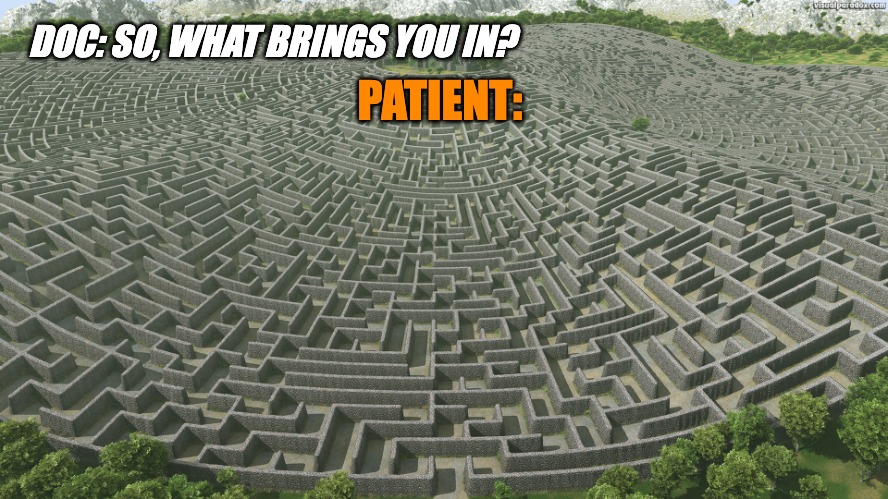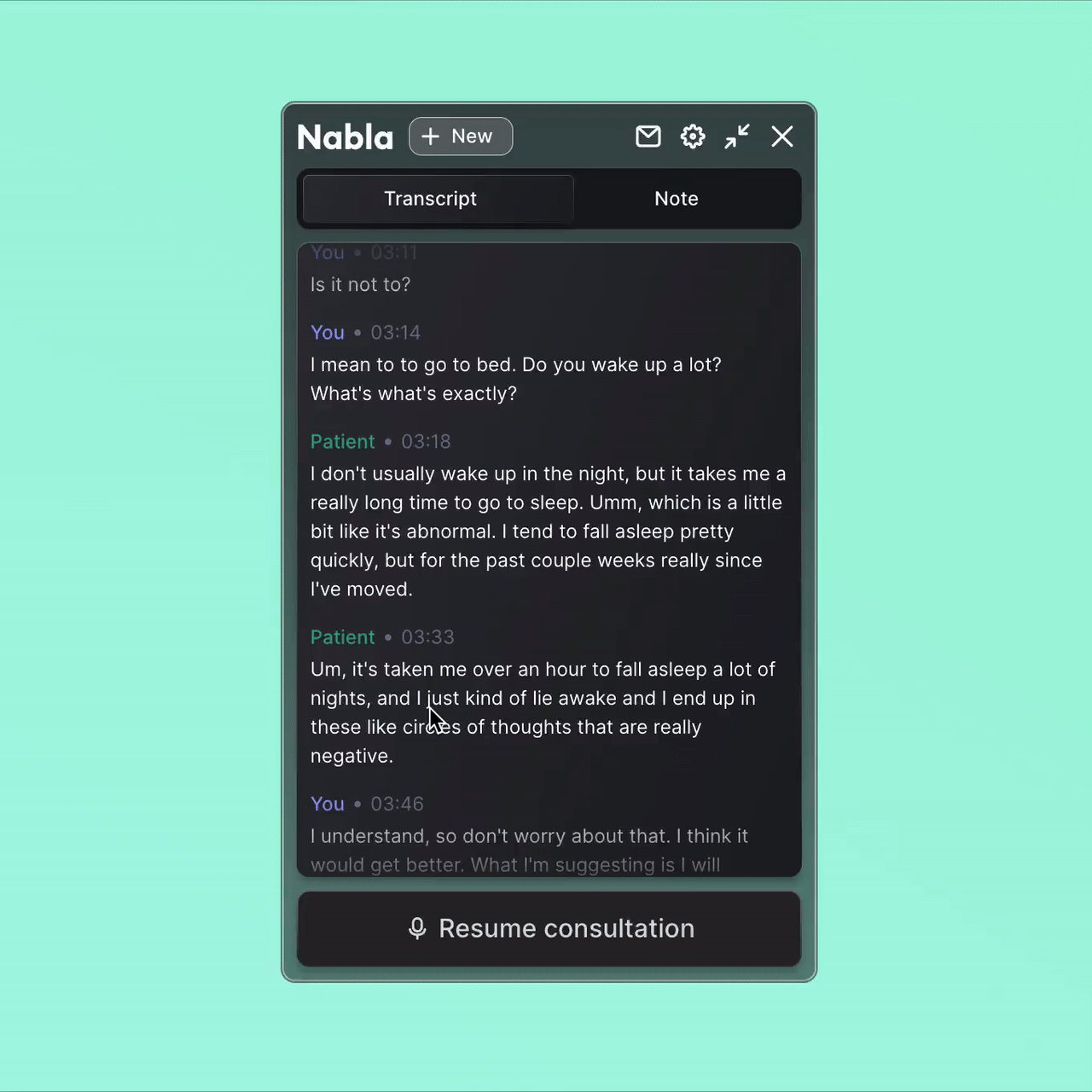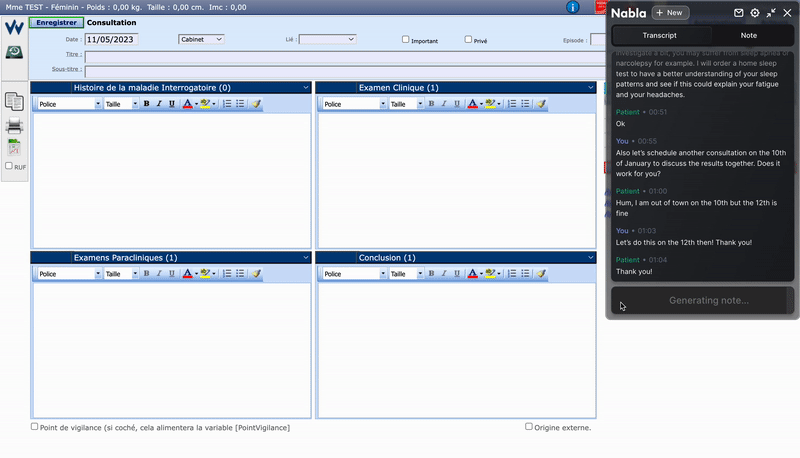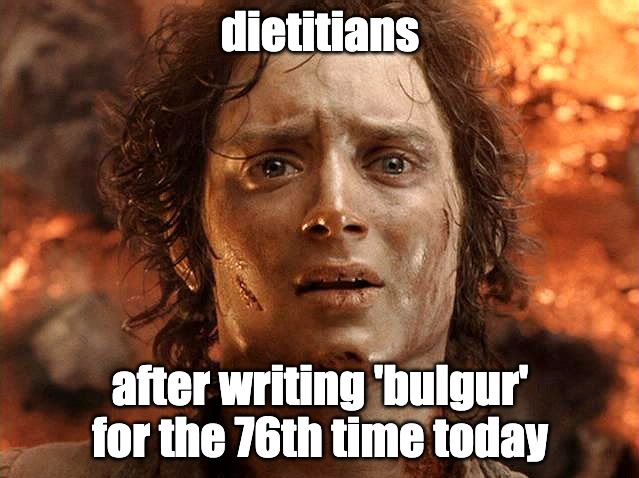10 ways clinicians use an AI medical scribe

Clément Baudelaire
ML Product Manager

Delphine Groll
Cofounder & COO
Just two months ago, we unveiled our AI tool, Nabla, designed to generate clinical notes in mere seconds.
Yes, you heard that right – seconds! Don't just take our word for it, try it out yourself in just one click with our Chrome extension or our web app.
When we embarked on this journey, we envisioned a world where clinicians could sit back in their cushy chairs with their patients, fully engaged and attentive, rather than frantically pounding away behind computer screens. But, as it turns out, it has become much more than that.
In essence, Nabla’s foray into the healthcare arena has taught us a major lesson – our product holds as much potential as there are healthcare professionals using it.
So, without further ado, let's talk about what Nabla has done for some of these very cool healthcare pros, and the ways they use it.
🏃 For deskless doctors
Dr. James Schwartz, MD
Picture this: Dr. James Schwartz is a correctional physician, constantly zooming around in his orthopedic shoes, turning sitting down into an elusive luxury. He's too busy juggling patient care and administrative mayhem to cozy up in a chair.
In this case, Nabla provides deskless docs with notes that generate as quickly as they run from patient to patient. Who needs chairs anyway?

🧵 For convoluted consultations
Dr. Carole Maupain, cardiologist
Some specialists face consultations so complex that they could make a Rubik's Cube cry.
Carole Maupain, a cardiologist, is one of these docs. She spends substantial time face-to-face with her patients. In her line of work, drafting comprehensive summaries can quickly become a nightmarish ordeal. And the chaos of simultaneously listening and writing can potentially lead to crucial details slipping through the cracks.
Nabla is also effective for all chatty patients in general. By structuring the conversation into a clinical note, Nabla guides them through patients’ narrative mazes, even when the conversation takes unexpected detours.

⚡ For swift sessions
Dr. Alexis Roullaud, GP
Now imagine this: a bustling waiting room, prehistoric Cosmo magazines, and a hyperactive toddler adorning the pristine walls with snot-based artwork. Pure bliss, right?
Behind the consultation room door, a stressed-out GP battles the cramps of documenting each session in what ends up being a never-ending sprint.
Though exaggerated for comedic effect, this scenario resonates with most primary care doctors. For physicians like Alexis Roullaud, the day often unfolds in 15-minute intervals, with patients lined up back-to-back, leaving no room to catch their breath or adequately document.

📝 For sympathetic summarizers
Dr. Eric Arzubi, Psychiatrist at Frontier Psychiatry
Have you ever left the doctor's office with a brain full of fog? You're not alone. Patients can forget up to 80% of what the doctor said once they step out. Doctors like Eric Arzubi are well aware of this, which is why, once they generate a clinical note, they also send it to their patients, as a summary of the consultation.

No more head-scratching moments or "wait, what did the doctor say?" situations.
🎙️ For dictation divas
Dr. Karima Ammazzough, GP
Some doctors are fond of dictating their notes to an imaginary audience. Sort of like you rehearsing your Oscar acceptance speech in front of the mirror, except the stakes may be a little higher.
That's Dr. Karima Ammazzough for you. Yet, let's face it, post-consultation dictation isn't the epitome of efficiency. But what if the dictation occurred as the patient spoke and turned itself into a structured summary? Not to spoil it or anything - but it can.

🧠 For mind masters
Brad Winter, Psychiatric nurse
Brad Winter, is a psychiatric mental health nurse practitioner based in Massachusetts This means that patients come in regularly, sometimes weekly. Much of her work involves linking different sessions together to understand the patient's journey. Nabla transcripts have become the glue that holds the story together and allow her to create organic threads between each session.
For mental health professionals, the ability to quote patients in their notes is extremely valuable. Thanks to Nabla’s highlighting feature designed specifically for mental health professionals, they can highlight specific part of a consultation’s transcript. So they can get to know their patients in their own words.

⌨️ Against keyboard kryptonite
Dr. Véronique Cayol, OB-GYN
Let's raise a fancy glass to the classy docs who prefer pens and paper over clunky keyboards. Frantically tapping away at the little boxes in the EHR like an endless game of poorly designed Tetris? Not their cup of tea. But they're stuck with boring templates and text expanders that could put anyone to sleep. Dr. Véronique Cayol, a French gynecologist, is one of these docs.
In her case, Nabla is the EHR-integrated scribe that allows her to focus on patients without having to dance the frustrating template tango.


🍳 For deadpan dietitians
Laetitia Willerval, dietitian
Imagine having to write down the ingredients of Jennifer Aniston's quinoa salad seven times a day. Talk about a recipe for torture. Well, that's the life of most dietitians and nutritionists. For Laetitia Willerval, Nabla means no more playing the grocery list scribe during sessions and instead focusing on the meat of the consultation (we do apologize for the tasteless puns).

🎮 For remote controllers
Dr. Jeff Gladd, Integrative medicine physician
For physicians practicing remote patient monitoring, note-taking is not only a quality of care issue, but also an important aspect of their livelihood. The more time they spend on it, the less 💵 they get. In this case, Nabla serves as a return-on-investment booster, not just in terms of time, but also in terms of money.

🧑��⚕️ For clinicians who want a life
Rebecca Allen-Jones, Family Nurse Practitioner in Troy, Alabama
Newsflash, folks! Doctors are humans too. They may have a vocation for providing care, but they also value their personal lives. Whether it's spending time with their aspiring snotty painters or heading to the bar for happy hour, no doctor wants to be stuck at the office after hours, typing away consultation summaries. It's no fun. Nabla gives doctors their time back to do whatever they wish, freeing them from the clutches of never-ending documentation.
